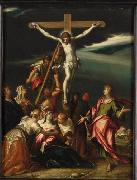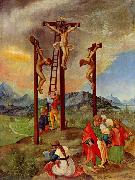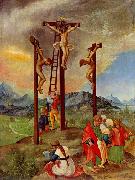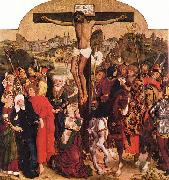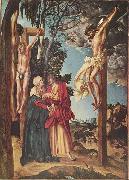Wholesale Oil Painting No Minimum |
|||||||||||
|
|
|||||||||||

|
|||||||||||
|
|
|
||||||||
Hans von Aachenwas a German mannerist painter. His name is derived from the birth place of his father, Aachen in Germany. Other variations of the name include Johann von - and - von Achen and various concisions like Janachen, Fanachen, Abak, Jean Dac, Aquano, van Aken etc. Hans von Aachen began painting in Germany as a pupil of the Flemish master E. Jerrigh. He then moved to Italy in 1574 to study further. He toured Rome and Florence, but eventually settled in Venice. He initially became a pupil of Kaspar Rems, but soon decided to develop his own mannerist technique, by studying Tintoretto and Michelangelo's followers. However, during all of his life he was influenced by the style of Bartholomeus Spranger and Hendrick Goltzius who dominated the art scene in Germany at the time. He returned to Germany in 1588 where he became well known as a painter of portraits for noble houses. He painted several works for Duke William V of Bavaria. He married Regina, the daughter of the composer Orlando di Lasso in Munich. In Munich he came into contact with the Imperial Court in Prague. In 1592 he was appointed official painter of Rudolph II, Holy Roman Emperor. However, Von Aachen only moved to Prague in 1601, where he stayed painting commissions from Emperor Rudolph II, and later from Matthias I. Amongst van Aachens pupils were Peter Isaak and Joseph Heinz. His works have been copied by Wolfgang Kilian, Dominicus Custos and Jan Sadeler. |
||||||||
|
|
||||||||
Kreuzigung Christi
Kreuzigung Christi Painting ID:: 67959 |
Year Deutsch: nach 1600
Technique Deutsch: Kupfer
Dimensions Deutsch: 33 x 26 cm
Year Deutsch: nach 1600 Technique Deutsch: Kupfer Dimensions Deutsch: 33 x 26 cm |
|||||||
|
|
||||||||
Albrecht AltdorferGerman 1480-1538 Albrecht Altdorfer Galleries He most often painted religious scenes, but is mainly famous as the first frequent painter of pure landscape, and also compositions dominated by their landscape. Taking and developing the landscape style of Lucas Cranach the Elder, he shows the hilly landscape of the Danube valley with thick forests of drooping and crumbling firs and larches hung with moss, and often dramatic colouring from a rising or setting sun. His Landscape with footbridge (National Gallery, London) of 1518-20 is claimed to be the first pure landscape in oil. He also made many fine finished drawings, mostly landscapes, in pen and watercolour. His best religious scenes are intense, sometimes verging on the expressionistic, and often depict moments of intimacy between Christ and his mother, or others. His most famous religious artwork is the The Legend of St. Sebastian and the Passion of Christ that decorated the altar in the St. Florian monastery in Linz, Austria. He often distorts perspective to subtle effect. His donor figures are often painted completely out of scale with the main scene, as in paintings of the previous centuries. He also painted some portraits; overall his painted oeuvre was not large. |
||||||||
|
|
||||||||
|
|
Kreuzigung Christi
Kreuzigung Christi Painting ID:: 79600 |
1526(1526)
Oil on wood
28,7 x 20,8 cm
cjr 1526(1526) Oil on wood 28,7 x 20,8 cm cjr |
||||||
|
|
||||||||
Albrecht AltdorferGerman 1480-1538 Albrecht Altdorfer Galleries He most often painted religious scenes, but is mainly famous as the first frequent painter of pure landscape, and also compositions dominated by their landscape. Taking and developing the landscape style of Lucas Cranach the Elder, he shows the hilly landscape of the Danube valley with thick forests of drooping and crumbling firs and larches hung with moss, and often dramatic colouring from a rising or setting sun. His Landscape with footbridge (National Gallery, London) of 1518-20 is claimed to be the first pure landscape in oil. He also made many fine finished drawings, mostly landscapes, in pen and watercolour. His best religious scenes are intense, sometimes verging on the expressionistic, and often depict moments of intimacy between Christ and his mother, or others. His most famous religious artwork is the The Legend of St. Sebastian and the Passion of Christ that decorated the altar in the St. Florian monastery in Linz, Austria. He often distorts perspective to subtle effect. His donor figures are often painted completely out of scale with the main scene, as in paintings of the previous centuries. He also painted some portraits; overall his painted oeuvre was not large. |
||||||||
|
|
||||||||
|
|
Kreuzigung Christi
Kreuzigung Christi Painting ID:: 82439 |
1526(1526)
Medium Oil on wood
Dimensions 28,7 x 20,8 cm
cyf 1526(1526) Medium Oil on wood Dimensions 28,7 x 20,8 cm cyf |
||||||
|
|
||||||||
PLEYDENWURFF, HansGerman Northern Renaissance Painter, 1420-1472 |
||||||||
|
|
||||||||
|
|
Kreuzigung Christi
Kreuzigung Christi Painting ID:: 83198 |
c. 1470
Medium Oil on panel
Dimensions 192 x 181 cm (75.6 x 71.3 in)
cyf c. 1470 Medium Oil on panel Dimensions 192 x 181 cm (75.6 x 71.3 in) cyf |
||||||
|
|
||||||||
Lucas CranachKronach 1472-Weimar 1553 German painter and engraver. The son of a painter, he settled in Wittenberg c.1504 and was court painter successively under three electors of Saxony. There he maintained a flourishing workshop and was twice burgomaster. Cranach was a close friend of Martin Luther, whose doctrine he upheld in numerous paintings and woodcuts, and he has been called the painter of the Reformation. He was a rapid and prolific painter, and the work turned out by his studio is uneven in quality. Naïve and fanciful, often awkward in draftsmanship, it has, nonetheless, freshness and originality and a warm, rich palette. His portraits are particularly successful. Among his best-known works are Repose in Egypt (Gemäldgalerie, Staatliche Mus., Berlin-Dahlem); Judgment of Paris (Staatliche Kunsthalle, Karlsruhe); Adam and Eve (Courtauld Inst., London); and Crucifixion (Weimar). The latter contains figures of Luther and Cranach. His many famous protraits include those of Elector John Frederick and Self-Portrait (Uffizi). Cranach was also an accomplished miniaturist. He produced a few copperplates and designs for woodcuts. His son and pupil Lucas Cranach, the Younger, |
||||||||
|
|
||||||||
|
|
Kreuzigung Christi
Kreuzigung Christi Painting ID:: 86047 |
Date 1503(1503)
Medium Oil on wood
Dimensions 138 x 99 cm (54.3 x 39 in)
cjr Date 1503(1503) Medium Oil on wood Dimensions 138 x 99 cm (54.3 x 39 in) cjr |
||||||
|
|
||||||||
|
Lucas Cranach Kronach 1472-Weimar 1553 German painter and engraver. The son of a painter, he settled in Wittenberg c.1504 and was court painter successively under three electors of Saxony. There he maintained a flourishing workshop and was twice burgomaster. Cranach was a close friend of Martin Luther, whose doctrine he upheld in numerous paintings and woodcuts, and he has been called the painter of the Reformation. He was a rapid and prolific painter, and the work turned out by his studio is uneven in quality. Naïve and fanciful, often awkward in draftsmanship, it has, nonetheless, freshness and originality and a warm, rich palette. His portraits are particularly successful. Among his best-known works are Repose in Egypt (Gemäldgalerie, Staatliche Mus., Berlin-Dahlem); Judgment of Paris (Staatliche Kunsthalle, Karlsruhe); Adam and Eve (Courtauld Inst., London); and Crucifixion (Weimar). The latter contains figures of Luther and Cranach. His many famous protraits include those of Elector John Frederick and Self-Portrait (Uffizi). Cranach was also an accomplished miniaturist. He produced a few copperplates and designs for woodcuts. His son and pupil Lucas Cranach, the Younger, Kreuzigung Christi Date 1503(1503) Medium Oil on wood Dimensions 138 x 99 cm (54.3 x 39 in) cjr |
||||||||
|
|
||||||||
|
Prev Next
|
||||||||
|
|
||||||||
|
Related Paintings to Lucas Cranach :. |
||||||||
|
|
||||||||
|
CONTACT US |
